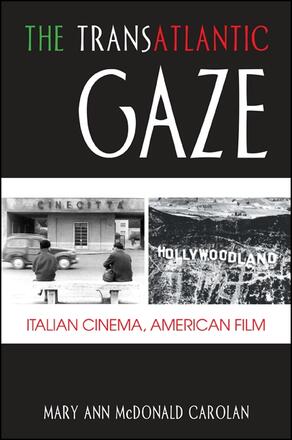
The Transatlantic Gaze
Italian Cinema, American Film
Alternative formats available from:
Tracks the influence of Italian cinema on American film from the postwar period to the present.
Description
In The Transatlantic Gaze, Mary Ann McDonald Carolan documents the sustained and profound artistic impact of Italian directors, actors, and screenwriters on American film. Working across a variety of genres, including neorealism, comedy, the Western, and the art film, Carolan explores how and why American directors from Woody Allen to Quentin Tarantino have adapted certain Italian trademark techniques and motifs. Allen's To Rome with Love (2012), for example, is an homage to the genius of Italian filmmakers, and to Federico Fellini in particular, whose Lo sceicco bianco/The White Sheik (1952) also resonates with Allen's The Purple Rose of Cairo (1985) as well as with Neil LaBute's Nurse Betty (2000). Tarantino's Kill Bill saga (2003, 2004) plays off elements of Sergio Leone's spaghetti Western C'era una volta il West/Once Upon a Time in the West (1968), a transatlantic conversation about the Western that continues in Tarantino's Oscar-winning Django Unchained (2012). Lee Daniels's Precious (2009) and Spike Lee's Miracle at St. Anna (2008), meanwhile, demonstrate that the neorealism of Roberto Rossellini and Vittorio De Sica, which arose from the political and economic exigencies of postwar Italy, is an effective vehicle for critiquing social issues such as poverty and racism in a contemporary American context. The book concludes with an examination of American remakes of popular Italian films, a comparison that offers insight into the similarities and differences between the two cultures and the transformations in genre, both subtle and obvious, that underlie this form of cross-cultural exchange.
Mary Ann McDonald Carolan is Associate Professor of Modern Languages and Literatures and Director of the Italian Studies Program at Fairfield University.
Reviews
". ..a well-written, scholarly study that offers novel, thought-provoking notions for further research. It is a welcome addition to the growing field of Italian film scholarship and will be very useful in Italian American film courses. " — Annali d'Italianistica
"…The Transatlantic Gaze offers a thought-provoking analysis of what happens when cinematic worlds collide. " — Journal of Transatlantic Studies
"One of the principal merits of this book is its structural and expository clarity … This clearly written text is of interest to those in the field and … to those who are unfamiliar with the subject matter. An easy and pleasant read, while at the same time rich and stimulating, McDonald Carolan's book constitutes a significant contribution to the analysis of the links between national cinemas. " — Italica
"…a meticulous work of love that juxtaposes some of the best Italian and American films produced since the end of World War II up until the second decade of the new millennium in order to unveil the influence of Italian cinema on American film … The detailed analyses of this scrupulous work are of interest not only to scholars of cinema and Italian studies, but also to those engaged in comparative, cultural, American and Italian-American studies. " — Journal of Modern Italian Studies
"…an excellent reference for scholars … Innovative, well-written and well-argued, The Transatlantic Gaze not only represents an important contribution to the field of film studies, but also to the area of Italian cultural studies, inserting itself into a series of works that study the influence of Italian culture but are written in English and thus directed towards an anglophone audience. " — Journal of Italian Cinema and Media Studies
"…insightful … In detailed readings and comparisons, and thanks in part to the well-chosen quotations that she meticulously analyzes, Carolan is masterful in acknowledging the tremendous impact that the Italian filmmakers have had on their American counterparts. " — CHOICE
"…Carolan has written an astutely focused text on a universally acknowledged subject, but one that is rarely covered these days, even in academia … this book is an excellent reference for scholars and could provide movie buffs or Italophiles with a wealth of film trivia. " — San Francisco Book Review